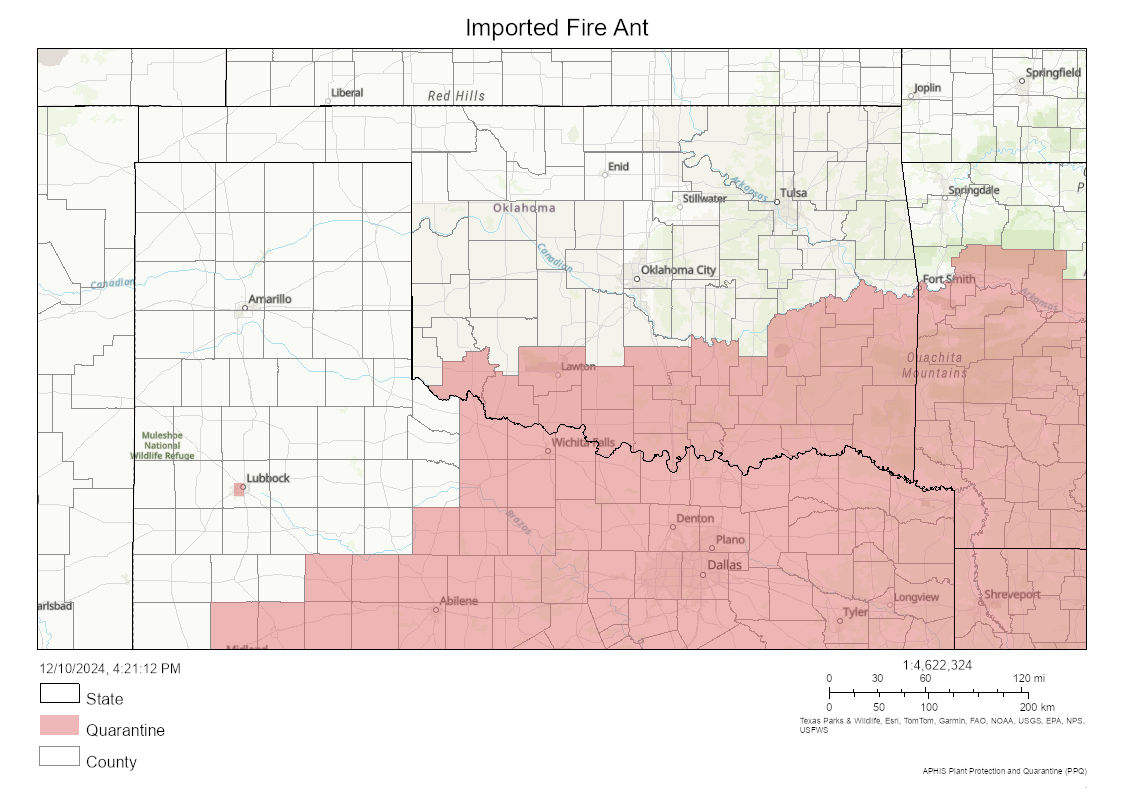Red Imported Fire Ants
Red Imported Fire Ants (RIFA), Solenopsis invicta Buren, are stinging insects that belong to the same order as bees and wasps. The RIFA now infests more than 325 million acres in the southern United States, where it has become a considerable agricultural pest and a significant health hazard.
The most significant problem associated with fire ants is their stinging behavior. The ants are very aggressive and will readily attack anything that disturbs their mound. After firmly grasping the skin with its jaws, the fire ant arches its back as it inserts its rear-end stinger into the flesh, injecting venom from the poison sac. It then pivots at the head and typically inflicts an average of seven to eight stings in a circular pattern. Fire ant venom is unique because of the high concentration of toxins, which are responsible for the burning pain characteristic of fire ant stings.
In Oklahoma, the OSU Department of Entomology and Plant Pathology and Oklahoma Department
of Agriculture, Food, and Forestry are dedicated to providing practical solutions
to problems created by fire ants through research and extension. To learn more about
our goals in these areas, visit our Extension goals page.
Expanded Quarantine
On Mar 24, 2009, the Animal and Plant Health Inspection Service (APHIS) in cooperation with the State Plant Regulatory Official of Oklahoma, made final an order increasing the numbers of counties in Oklahoma under state and federal quarantine for imported fire ants, Solenopsis invicta.
This action imposes regulatory restrictions on the interstate movement of regulated articles that are not currently in the IFA quarantine area. The quarantine expansion was based on multi-year surveys by the Oklahoma Department of Agriculture, Food, and Forestry (ODAFF). All of the counties listed are quarantined because of the IFA plant pest whether the surveys showed that the entire county or infested portions of the county or expanded infested portions of the county confirmed the existence of established populations of IFA.
For more information on "regulated articles" please see APHIS Program Aid No. 1904. The following regulated articles require a certificate or permit before they can be shipped outside the quarantined area:
- Imported fire ant queens and reproducing colonies of imported fire ants.
- Soil, separately or with other things, except soil samples shipped to approved laboratories (consult with a State or Federal inspector for a list of approved laboratories). Potting soil is exempt if commercially prepared, packaged, and shipped in original container.
- Plants with roots and soil attached, except house plants maintained indoors and not for sale.
- Grass sod.
- Baled hay and straw that has been stored in contact with soil.
- Used soil-moving equipment.
- Any other products, articles, or means of conveyance of any character whatsoever not covered by the above, when it is determined by an inspector that they present a hazard of spread of the imported fire ant and the person in possession thereof has been so notified.
RIFA Educational Materials
- A Word About Fire Ants and Pest Control Philosophy
- Fire Ants - Inside the House!
- Pesticides Approved for use in Oklahoma
- Quick Tips - Some Do's and Don'ts
- RIFA Biology
- Two-Step Method
- Mississippi State Fire Ant Website
- Phorid Fly Research
- Texas A&M Fire Ant Website
- University of Florida Fire Ant Website
- Wiki - RIFA

